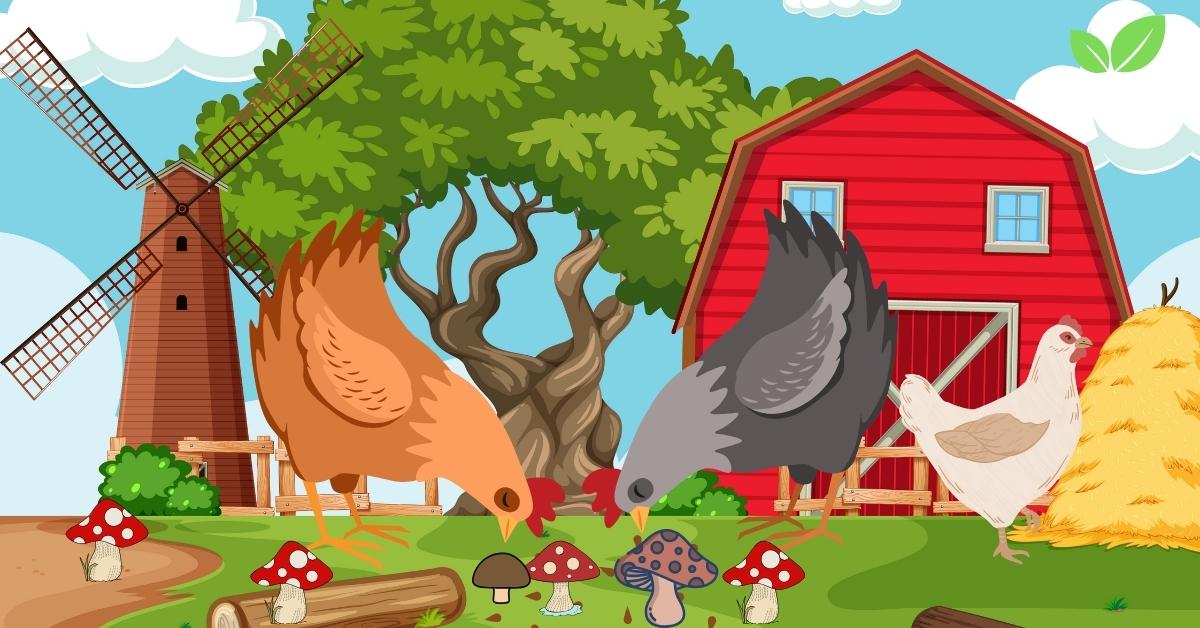Chickens are among the most widely kept domesticated animals across the world, and their health and nutrition are of utmost importance to poultry farmers and backyard enthusiasts alike. In the pursuit of providing optimal nutrition for chickens, many owners experiment with various foods to enhance their birds’ well-being. One common question that arises is: Can chickens have mushrooms?
Mushrooms are a fascinating food source, rich in nutrients and unique compounds, but their inclusion in animal diets, especially for chickens, raises questions about safety, nutritional value, and overall impact on their health. In this article, we will explore the environmental niche of mushrooms in chicken diets, addressing the safety of mushrooms for chickens, their nutritional benefits, and potential risks, as well as their place in a broader ecological and agricultural context.
Understanding Chicken Diets: A Brief Overview
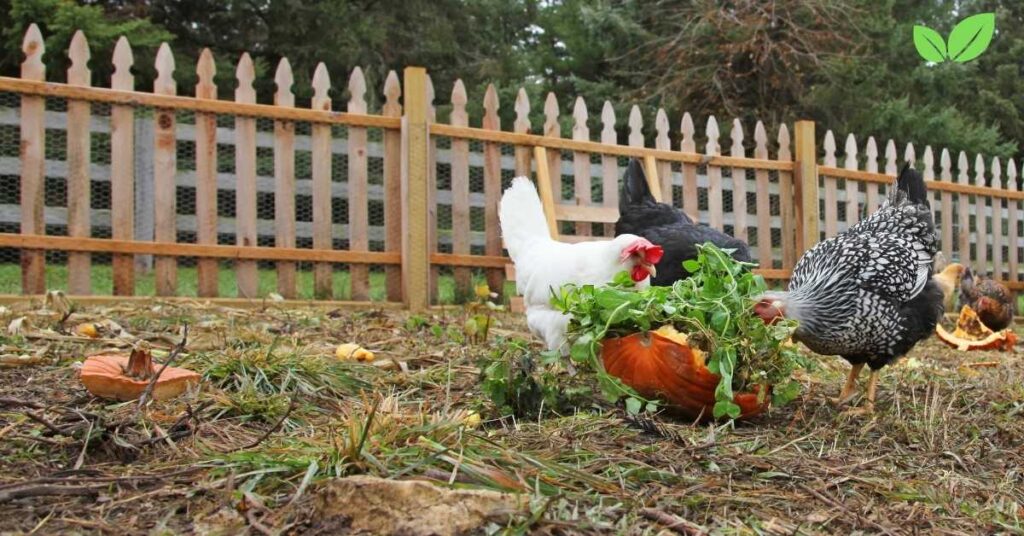
The Natural Diet of Chickens
Chickens are omnivorous creatures with a highly versatile diet. In the wild or in free-range settings, chickens typically forage for a variety of foods, including insects, seeds, grasses, and small animals. Their ability to digest plant and animal matter allows them to obtain a well-rounded diet that includes proteins, fats, and carbohydrates, along with essential vitamins and minerals.
The Role of Commercial Feed
For most poultry owners, commercial feed forms the cornerstone of a chicken’s diet. These feeds are specially formulated to provide balanced nutrition, containing grains, proteins, and necessary additives like calcium and vitamins. However, many chicken owners supplement commercial feed with table scraps, fruits, vegetables, and even foraged foods like bugs and weeds. Mushrooms, in particular, raise the question of whether they can be safely incorporated into a chicken’s diet.
The Nutritional Profile of Mushrooms
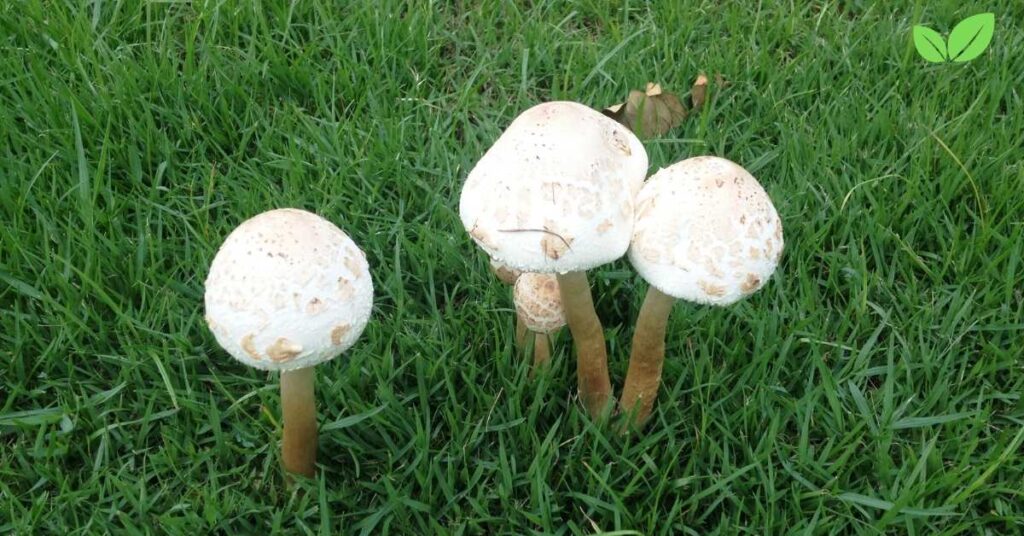
What Nutrients Do Mushrooms Contain?
Mushrooms are a rich source of nutrients and bioactive compounds, making them a popular choice for human consumption. Key nutrients found in mushrooms include:
- Proteins: Mushrooms provide a moderate amount of protein, which is essential for building and repairing tissues in both humans and animals, including chickens.
- Fiber: Mushrooms contain dietary fiber, which supports healthy digestion.
- Vitamins: Mushrooms are an excellent source of B vitamins, such as riboflavin (B2), niacin (B3), and pantothenic acid (B5). They are also one of the few natural food sources of vitamin D when exposed to sunlight or UV light.
- Minerals: Mushrooms provide essential minerals like selenium, potassium, and phosphorus.
- Antioxidants: Mushrooms contain various antioxidants, including ergothioneine, which may protect cells from oxidative stress and contribute to overall health.
Given this nutrient profile, mushrooms have the potential to offer some health benefits to chickens. However, before adding mushrooms to their diet, it is crucial to understand which types of mushrooms are safe and which are harmful.
Can Chickens Have Mushrooms? Understanding the Safety Concerns
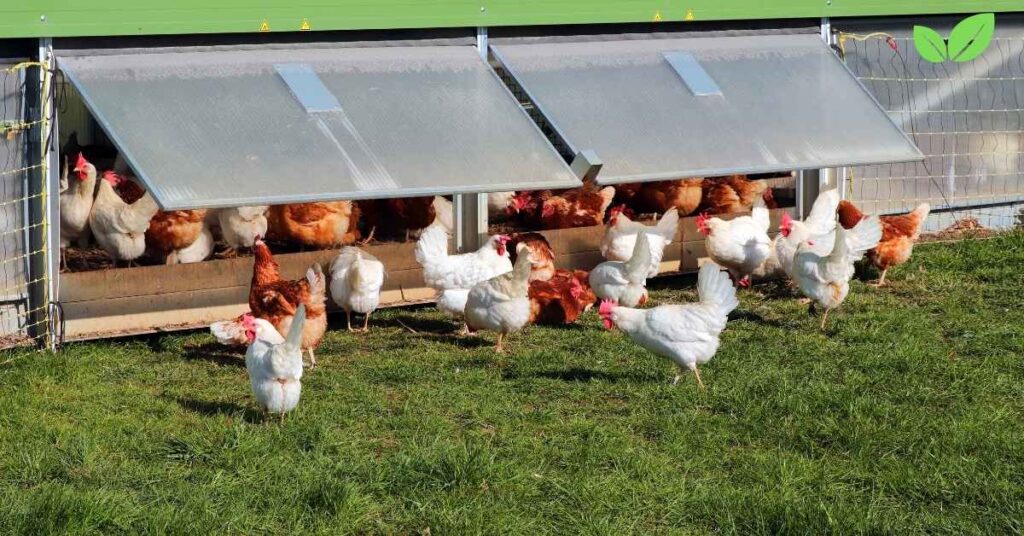
Edible vs. Toxic Mushrooms
The primary concern with feeding mushrooms to chickens stems from the fact that not all mushrooms are created equal. While many mushrooms are safe and nutritious, some species are highly toxic. Even experienced mushroom foragers can struggle to differentiate between edible and poisonous varieties, which presents a significant risk when feeding mushrooms to chickens.
Some mushrooms, like Agaricus bisporus (the common white button mushroom) and Agaricus campestris (the field mushroom), are commonly consumed by humans and are generally considered safe for chickens. These edible mushrooms contain no toxic compounds and provide nutrients that could be beneficial to chickens. On the other hand, certain wild mushrooms, such as those from the Amanita or Galerina genera, are extremely poisonous and should never be consumed by humans or animals.
Potential Risks of Feeding Mushrooms to Chickens
Even with edible mushrooms, there are risks that poultry owners should be aware of:
- Toxic Mushrooms: Chickens are not as discerning as humans when it comes to foraging, and they may accidentally ingest toxic mushrooms if they are foraging in wooded areas or damp environments where wild mushrooms grow. Poisonous mushrooms, such as the Amanita species, can cause severe health issues, including liver damage, neurological symptoms, and even death.
- Digestive Upset: Chickens have sensitive digestive systems, and even edible mushrooms might cause digestive upset if fed in excess or if the chickens are not accustomed to them. Introducing any new food into a chicken’s diet should be done gradually to avoid gastrointestinal issues.
- Fungal Infections: In some cases, feeding mushrooms or fungal material to chickens could increase their risk of fungal infections, particularly if the mushrooms are not fresh or if they have been contaminated with harmful molds. Moldy food is a well-known risk factor for chickens, as certain molds can produce mycotoxins that are harmful to poultry.
Symptoms of Mushroom Poisoning in Chickens
If chickens consume toxic mushrooms, they may display a range of symptoms depending on the species and quantity ingested. Common signs of mushroom poisoning include:
- Lethargy or weakness
- Loss of appetite
- Diarrhea or vomiting
- Tremors or seizures
- Difficulty walking or loss of coordination
If you suspect that your chickens have eaten poisonous mushrooms, it is crucial to seek veterinary care immediately. Quick intervention can sometimes prevent severe outcomes.
Nutritional Benefits of Safe Mushrooms for Chickens
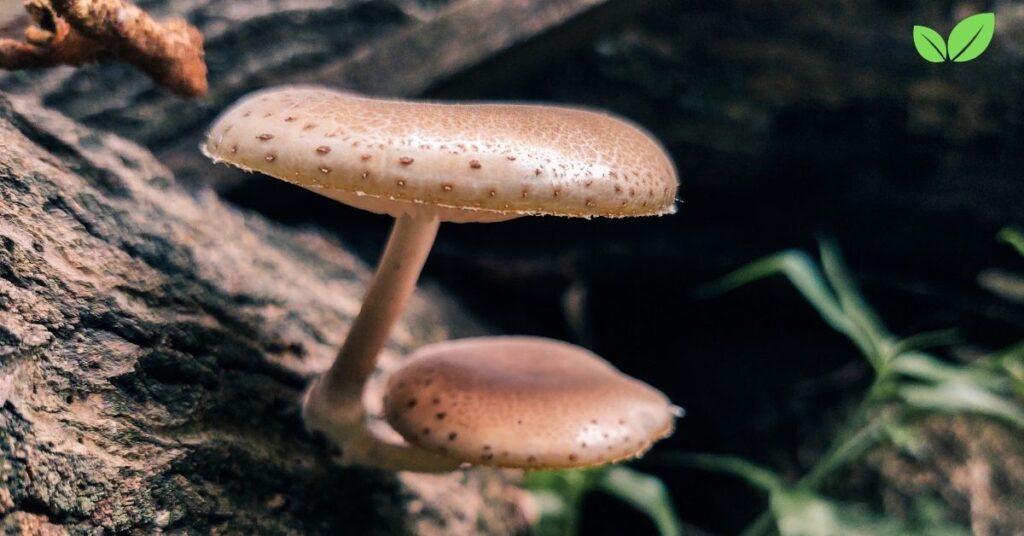
Protein and Amino Acids
Chickens require a diet rich in protein, especially during periods of growth, molting, or egg production. Edible mushrooms provide a moderate amount of protein, which can supplement a chicken’s diet. However, mushrooms should not be relied upon as the primary source of protein, as their protein content is relatively low compared to animal-based or high-protein feed ingredients like soybean meal or insects.
B Vitamins for Energy and Metabolism
Mushrooms are an excellent source of B vitamins, which are essential for energy production and metabolic processes in chickens. These vitamins help convert food into energy and support the health of the nervous system. For chickens that are laying eggs or growing, these nutrients can be particularly beneficial.
Vitamin D: Supporting Eggshell Strength
One of the unique benefits of mushrooms is their ability to produce vitamin D when exposed to sunlight. Chickens that are kept indoors or do not have sufficient access to sunlight may benefit from vitamin D in their diet, as it plays a crucial role in calcium absorption and the formation of strong eggshells. However, the amount of vitamin D provided by mushrooms is relatively small, and most commercial chicken feeds are already fortified with this essential nutrient.
Antioxidants and Immune Support
Mushrooms contain antioxidants such as ergothioneine, which can help reduce oxidative stress and support the immune system. A healthy immune system is vital for chickens, as they are constantly exposed to potential pathogens in their environment. Including antioxidant-rich foods like mushrooms in their diet may contribute to overall health and resilience against disease.
How to Safely Introduce Mushrooms to Chickens
Introducing mushrooms into a chicken’s diet can be done safely, but it is essential to follow proper guidelines to ensure that chickens are not exposed to harmful varieties. Here’s how you can safely introduce mushrooms to chickens while ensuring their health and well-being.
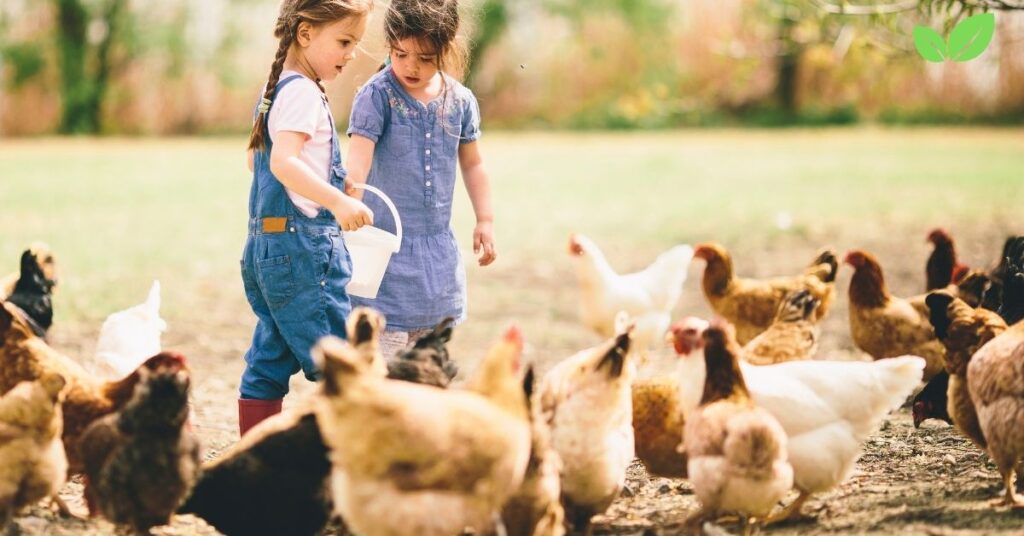
Choosing the Right Mushrooms
When deciding to feed mushrooms to chickens, it’s crucial to select species that are safe and non-toxic. The question of “can chickens have mushrooms” should always consider the type of mushroom being offered. Common store-bought varieties like white button mushrooms, cremini mushrooms, and portobello mushrooms are generally considered safe for chickens. These mushrooms are cultivated and do not contain any harmful toxins that could adversely affect the birds.
On the other hand, wild mushrooms can pose significant risks. If you’re wondering “can chickens have mushrooms” that are found in the wild, it is essential to avoid feeding them unless you are an expert at identifying non-toxic varieties. Even experienced foragers can have difficulty distinguishing between safe and poisonous species. To ensure safety, always rely on store-bought mushrooms when adding them to your chicken’s diet.
Preparing Mushrooms for Chickens
Before feeding mushrooms to chickens, it’s recommended to prepare them properly. Can chickens have mushrooms that are raw? Yes, but cooking them can reduce the risk of digestive upset and make them easier to digest. When considering “can chickens have mushrooms” safely, cooking the mushrooms can help break down any potentially tough fibers and remove contaminants. Sauté or boil the mushrooms without adding salt, butter, or other seasonings. This way, you can ensure that the mushrooms remain healthy and safe for your flock.
Once the mushrooms are cooked, chop them into small, manageable pieces. This preparation is essential because large chunks may be difficult for chickens to peck at and digest. By offering bite-sized pieces, you’re ensuring that your chickens can enjoy mushrooms without the risk of choking or digestive issues.
Feeding Mushrooms in Moderation
One critical point to remember when feeding mushrooms to chickens is moderation. Can chickens have mushrooms as a regular part of their diet? Mushrooms should be considered an occasional treat rather than a staple. Start by introducing small amounts of mushrooms mixed with their regular food. This gradual introduction allows you to monitor how they react to the new addition.
As with any new food, pay close attention to how your chickens respond. If there are no signs of digestive upset, such as diarrhea or lack of appetite, you can continue offering mushrooms occasionally. However, can chickens have mushrooms every day? It’s best not to overfeed them with mushrooms, as chickens require a balanced diet that includes grains, proteins, and calcium—nutrients that mushrooms alone cannot provide.
Mushrooms in the Broader Agricultural and Ecological Context
Mushrooms play a broader role in the environment, particularly in agricultural systems. Can chickens have mushrooms that are part of composting processes? Yes, and mushrooms contribute to nutrient cycling when integrated into compost. When combined with chicken manure, mushrooms can help break down organic matter, producing nutrient-rich compost that benefits soil health and plant growth. This symbiotic relationship is important in sustainable farming, where chickens and mushrooms can support each other’s ecosystems.
Mycoremediation: Using Mushrooms to Clean Contaminated Soils
A growing area of research in environmental science involves using mushrooms to clean contaminated soil. This process, known as mycoremediation, highlights how mushrooms can break down pollutants such as heavy metals and pesticides. While not directly related to the question, “can chickens have mushrooms,” it showcases the broader ecological importance of mushrooms in maintaining healthy agricultural environments. By incorporating mushrooms into composting and soil restoration practices, farmers can improve both crop production and the health of animals, including chickens, that interact with these systems.
Conclusion: Can Chickens Have Mushrooms?
In conclusion, “can chickens have mushrooms?” The answer is yes, but with careful consideration of the type, preparation, and moderation. Chickens can safely enjoy edible mushrooms like white button, cremini, and portobellos when prepared properly and fed occasionally. However, great caution must be taken to avoid toxic wild mushrooms, which can pose significant health risks.
By incorporating mushrooms into a balanced diet, chicken owners can provide their birds with extra nutrients and variety. While mushrooms should not replace traditional feed, they can serve as a healthy treat when managed properly. Understanding the relationship between chickens and mushrooms, along with the broader ecological benefits that fungi provide, ensures that you are making informed decisions for your flock’s diet.
Read More: Can Cows Eat Catnip? Exploring the Environmental and Agricultural Implications

